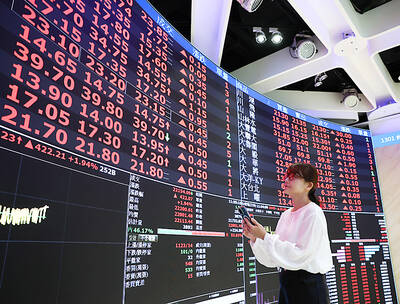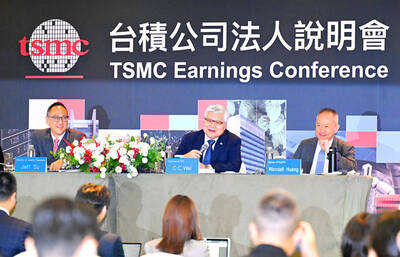■ENERGY
Alaska approves pipeline
Alaska lawmakers have approved a state license for TransCanada Corp to pursue a natural gas pipeline. The approval ends a decades-long battle to open up North Slope natural gas for use on the North American market. The state Senate approved the bill on Friday; the House gave its approval last week. It only awaits the signature of Alaskan Governor Sarah Palin, who has backed the Canadian proposal from the start. The license does not guarantee construction, but TransCanada must move forward on federal permitting applications for the 2,735km pipeline, which is estimated to cost between US$26 billion and US$30 billion.
■AUTOMOBILES
Car sales drop in US
The lowest auto demand in the US since 1993, soaring fuel prices and a weak economy have impacted General Motors, Toyota and Chrysler, which on Friday reported a drop in sales last month. Troubled US car giant General Motors reported a 27 percent decline in US sales last month, as well as a massive second-quarter loss of US$15.5 billion, or US$27.33 per share. GM and its US competitors Ford and Chrysler have been hit by a fall-off in the sales of sports utility vehicles because of high gas prices and are now trying to switch production to smaller, more economical cars. Chrysler’s sales last month were 98,109 units, 29 percent below the same period last year.
■AVIATION
Airbus sells German plant
European aircraft maker Airbus said on Friday it had sold its plant at Laupheim in Germany to German armaments company Diehl and its partner Thales. No details were provided on the financial details of the sale, which is effective from Oct. 1 and is subject to competition authority approval. Diehl, based in Nuremberg in the southern German state of Bavaria, is to hold 51 percent of the company, while French defense concern Thales holds the rest. Airbus chief executive Tom Enders said the sale was a significant element in the implementation of the Power8 program aimed at cutting costs at Airbus.
■MARKET
Managua market destroyed
A huge fire destroyed Managua’s landmark Oriental Market, wiping out 1,500 vendor stalls and causing an estimated US$100 million in damage, local media reported early yesterday. The conflagration raged on Friday for 11 hours, destroying most of the sprawling Mercado Oriental, reputedly Central America’s largest market hall. No injuries were reported. Nicaraguan President Daniel Ortega promised merchants that the market hall would be rebuilt. The building had been the only one of Managua’s three main markets to survive the capital’s devastating 1972 earthquake.
■TELECOMS
India to auction airwaves
India said on Friday it plans a global auction for airwaves to offer high-speed third generation or 3G mobile phone services, a move seen reaping the government up to US$10 billion. The long-awaited announcement is expected to improve service and spur even greater growth in the world’s fastest-expanding mobile market, which has been adding 8 million new subscribers monthly. Communications Minister Andimuthu Raja said the license auction would be held by December. The government imposed a floor reserve price of 20.2 billion rupees or US$480 million for licenses, but bidding could go much higher, based on 3G auctions held elsewhere, for the 60 megahertz of spectrum up for grabs.

UNCERTAINTIES: Exports surged 34.1% and private investment grew 7.03% to outpace expectations in the first half, although US tariffs could stall momentum The Chung-Hua Institution for Economic Research (CIER, 中華經濟研究院) yesterday raised its GDP growth forecast to 3.05 percent this year on a robust first-half performance, but warned that US tariff threats and external uncertainty could stall momentum in the second half of the year. “The first half proved exceptionally strong, allowing room for optimism,” CIER president Lien Hsien-ming (連賢明) said. “But the growth momentum may slow moving forward due to US tariffs.” The tariff threat poses definite downside risks, although the scale of the impact remains unclear given the unpredictability of US President Donald Trump’s policies, Lien said. Despite the headwinds, Taiwan is likely

READY TO BUY: Shortly after Nvidia announced the approval, Chinese firms scrambled to order the H20 GPUs, which the company must send to the US government for approval Nvidia Corp chief executive officer Jensen Huang (黃仁勳) late on Monday said the technology giant has won approval from US President Donald Trump’s administration to sell its advanced H20 graphics processing units (GPUs) used to develop artificial intelligence (AI) to China. The news came in a company blog post late on Monday and Huang also spoke about the coup on China’s state-run China Global Television Network in remarks shown on X. “The US government has assured Nvidia that licenses will be granted, and Nvidia hopes to start deliveries soon,” the post said. “Today, I’m announcing that the US government has approved for us

The National Stabilization Fund (NSF, 國安基金) is to continue supporting local shares, as uncertainties in international politics and the economy could affect Taiwanese industries’ global deployment and corporate profits, as well as affect stock movement and investor confidence, the Ministry of Finance said in a statement yesterday. The NT$500 billion (US$17.1 billion) fund would remain active in the stock market as the US’ tariff measures have not yet been fully finalized, which would drive international capital flows and global supply chain restructuring, the ministry said after the a meeting of the fund’s steering committee. Along with ongoing geopolitical risks and an unfavorable

DEMAND: The forecast did not factor in potential increases from lifted US restrictions on Nvidia’s H20 chips to China, which TSMC CEO C.C. Wei described as ‘good news’ Taiwan Semiconductor Manufacturing Co (TSMC, 台積電), a major chip supplier to Nvidia Corp, yesterday raised its revenue growth forecast for this year to 30 percent in US dollar terms, thanks to exceptionally strong demand for artificial intelligence (AI) and high-performance computing (HPC) applications. The new revenue growth forecast surpasses the 25 percent expansion estimated by TSMC three months ago and beat almost all industry analysts’ expectations. Booming AI demand helped propel the chipmaker’s net profit by 60.7 percent last quarter to a record high of NT$398.27 billion (US$13.54 billion), from NT$247.85 billion a year earlier. That represented a sequential increase of 10.2